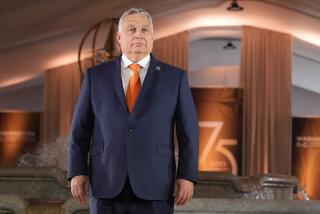China assails Sarkozy for Dalai Lama visit
- Share via
BEIJING — The Chinese government let loose Sunday with an official protest and a torrent of angry editorials denouncing French President Nicolas Sarkozy for a meeting over the weekend with the Dalai Lama.
Beijing is always prickly about world leaders meeting with the exiled Tibetan spiritual leader, but the outpouring against France was exceptional. It comes during a year in which France has emerged as China’s favorite whipping boy. Anti-French sentiments have been running high since April when pro-Tibetan protesters tried to wrestle away the Olympic torch during the relay through Paris.
China had warned Sarkozy for weeks against meeting with the Dalai Lama and withdrew from a planned summit with the European Union in anticipation. Sarkozy, who this year also holds the rotating EU presidency, met with the Tibetan for 30 minutes Saturday at a conference of Nobel laureates in Gdansk, Poland.
In Beijing, the French envoy, Herve Ladsous, was summoned to a Sunday evening meeting at the Chinese Foreign Ministry for what presumably was a severe tongue-lashing.
“This grossly interfered in China’s internal affairs,” Deputy Foreign Minister He Yafei told the ambassador, according to the state-run New China News Agency. He also said the meeting “gravely hurt the feelings of the Chinese people.”
The Foreign Ministry made no explicit threats about retaliatory measures it might take. But the New China News Agency quoted what it said were “netizens” who were calling for a boycott of French products.
“We should start boycotting French commodities and never travel to France,” the official news agency quoted someone writing on an Internet forum. Other bloggers on the Chinese site Sina.com denounced Sarkozy as “greedy and evil” and “an immature [politician] who thinks from his buttocks.” President Bush has met three times with the Dalai Lama, who advocates more freedoms for Tibetans within Chinese sovereignty; those meeting with him this year have included British Prime Minister Gordon Brown and German Chancellor Angela Merkel. All the meetings drew criticism from China, which views any recognition of the Dalai Lama as tantamount to support for a free Tibet. But the campaign against Sarkozy has been more vigorous.
Jean-Vincent Brisset, a Chinese specialist at France’s Institute for International and Strategic Relations, suggests that the French brought it on themselves by revealing that they were vulnerable to pressure.
Sarkozy hesitated for months about whether to attend the opening ceremony Aug. 8 of the Summer Olympics in Beijing, saying at first he wouldn’t attend unless Beijing improved its human rights record, then at the end showing up for the ceremony. Sarkozy also declined to meet the Dalai Lama when he was in France in late August, instead sending his wife, Carla Bruni, and Foreign Minister Bernard Kouchner.
“We made a show of weakness, and so the Chinese found us a soft target,” Brisset said. He believes that China’s protests against Sarkozy are a way of testing the European Union but says the Chinese won’t push too hard because of the economic turmoil in the United States.
“At the moment, they need Europe as a customer for their products more than we need them,” Brisset said.
Anti-French sentiment ran high in China over the summer with demonstrations outside French stores, especially the Carrefour chain, and many Chinese tour groups canceled trips to France.
After the meeting with the Dalai Lama, Sarkozy appealed to Beijing not to overreact.
“Let’s not make things tense. The world doesn’t need it,” the French president was quoted as saying.
Separately, on Friday the New York-based Human Rights Watch protested the imprisonment of a renowned 81-year-old artist and printer from the Tibetan capital, Lhasa. Paljor Norbu was taken from his home Oct. 31 on suspicion that he had printed “prohibited material,” including the banned Tibetan flag, according to the rights group.
Human Rights Watch said that Norbu’s workshop was well known for its use of traditional wood blocks to print Buddhist text. The group also protested China’s treatment of a senior monk, a judicial employee and a filmmaker who have been imprisoned recently.
--
Nicole Liu of The Times’ Beijing Bureau contributed to this report.
More to Read
Sign up for Essential California
The most important California stories and recommendations in your inbox every morning.
You may occasionally receive promotional content from the Los Angeles Times.










